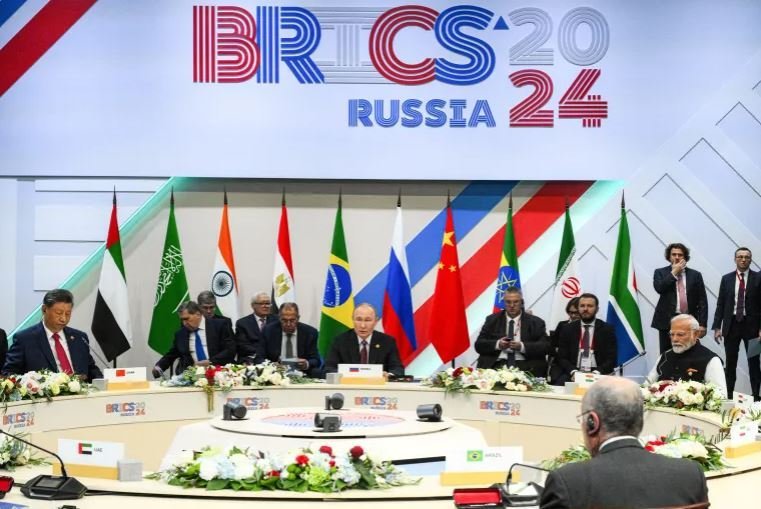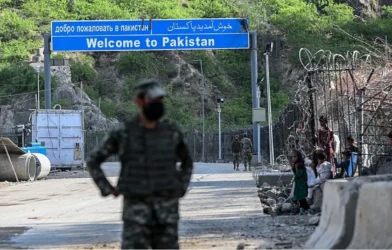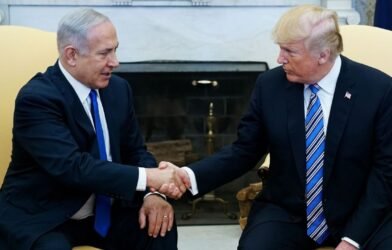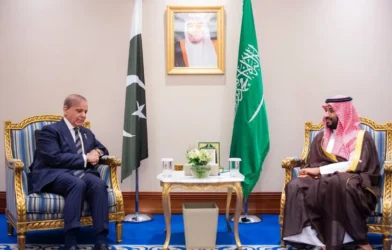Subtotal $0.00
Amid rapid geopolitical and economic shifts, the Global South, led by China and Russia, is seeking to reshape the international system, with the aim of breaking the hegemony of the West and realizing their growing interests.
As a direct response to the sanctions and obstacles imposed by the West to limit the rise of emerging economies, the BRICS organization, which includes Brazil, Russia, India, China and South Africa, was established as an attempt to promote cooperation among developing countries and meet their aspirations to build a more equitable global economic system.
The group seeks to develop independent financial and economic mechanisms that contribute to the rebalancing of economic forces at the global level.
New Development Bank
The BRICS organization, which includes about 40% of the world's population and more than 25% of global GDP, seeks to promote cooperation among developing countries with vast natural resources and huge markets that give them growing economic clout.
In an effort to provide alternatives to the dominant international financial institutions, BRICS created the New Development Bank (NDB), one of the most prominent tools of the bloc's economic confrontation with the West.
The bank is an alternative to Western financial institutions, allowing member states to finance their development projects and reduce their dependence on traditional Western-dominated financial systems, strengthening the independence of the economies of the Global South and redefining their role in the international system.
According to its official website, the bank was established in 2015 as a multilateral financial institution that aims to mobilize resources to finance infrastructure and sustainable development projects in BRICS and other developing countries.
Economic alliances
BRICS is increasingly supported by countries in the Global South seeking to minimize Western influence over their economies, and the interest of countries like Saudi Arabia and Argentina in joining the group reflects a growing desire to build alternative economic alliances outside the Western framework.
In addition, BRICS countries are strengthening cooperation in the fields of technology and energy, and some aspects of cooperation even extend to the military sphere, raising concerns among Western countries about the bloc's growing influence in the international arena.
China and Russia play a pivotal role in transforming BRICS into a platform to counter Western hegemony. Through the Belt and Road Initiative, Beijing seeks to promote economic and financial cooperation among member countries and reduce dependence on the US dollar.
Russia, on the other hand, uses the organization as a tool to counter the international isolation imposed on it by Western sanctions, as well as to create an alternative financial system and promote trade between member states using local currencies, thereby strengthening its economic independence.
Trade between China and Russia in 2024 saw record growth, driven by rising exports of Russian oil, gas and coal, reflecting growing economic cooperation between the two countries, according to TVBrix.
These efforts are part of a broader strategy aimed at building a multipolar world order that challenges US and European hegemony by linking Asia, Africa and Europe with an integrated network of infrastructure and trade, strengthening BRICS' position as a global economic powerhouse.
The West's Fear of BRICS
The West views BRICS as a tool to strengthen the influence of China and Russia in the Global South, which could weaken traditional Western alliances and present an alternative economic model that challenges Western hegemony and its ability to attract developing countries looking for new partners for cooperation and development.
At the recent BRICS summit, China and Russia called for greater economic cooperation and less reliance on the dollar, which has caused great concern in Washington, as US politicians see any attempt to undermine the dollar's dominance as a major blow to the US economy.
Washington fears that boosting trade among BRICS members using local currencies will diminish the dollar's role as a global reserve currency, threatening its standing in international financial markets.
Although the US and EU countries have different attitudes towards BRICS, both sides agree that they see it as an economic and strategic threat.
In addition, the ideological and political differences between the West and BRICS reflect differing views on human rights, governance, and democracy, which increases tensions between the two parties and reinforces the Western perception of BRICS as a bloc that seeks to reshape the global order along different lines than the traditional Western model.
BRICS and the Hegemonic Challenge
Discussions are escalating within BRICS about creating a single currency to replace the dollar, a radical move that could threaten the US-dominated global economic order.
These moves are worrying the West about the potential repercussions on global financial markets, as they could weaken the dollar's role as a global reserve currency. According to an article in Investing News Network, "The creation of a new BRICS reserve currency could lead to lower demand for the dollar, which would directly affect global economies."
The EU views BRICS as a powerful economic competitor, especially with the rapid growth of China and India, and the group's growing influence over global markets, natural resources, and international financial institutions.
On the one hand, EU countries are keen to maintain their economic ties with BRICS countries, especially India and Brazil, while on the other hand, they are strengthening their alliance with the United States to counter Chinese and Russian policies.
Despite economic competition, there are still areas of cooperation between the EU and BRICS, especially on global issues such as climate change, pandemic control, supply chain security, and counter-terrorism.
This intersection of interests reflects a degree of overlap between the two parties, despite fundamental differences over the global economic order.
In contrast, a joint article by Narayanappa Janardhan and Hussain Haqqani in The Hill argues that "BRICS expansion does not necessarily mean anti-Westernism, but rather reflects a shift toward a more independent economic model, with an emphasis on development and economic cooperation," suggesting that the group is not just aiming for confrontation, but seeks to establish a new global model of cooperation.
These developments reflect the West's growing concern about the impact of BRICS on the global economic order, particularly with regard to the status of the dollar and traditional economic relations.
As BRICS continues to expand and seek to create alternative financial institutions, the future of Western hegemony over the global economy comes into question as the world moves toward a more pluralistic system of economic and financial power.
Washington vs. BRICS
In the United States, BRICS is seen as a strategic and economic threat, and US President Donald Trump has voiced these concerns, calling BRICS a threat to national security and warning that any attempt to undermine the dollar would be a severe blow to the US economy.
Trump has threatened to impose 100% tariffs on BRICS imports if they go ahead with creating a single currency alternative to the dollar. In an interview with CNBC in March 2024, Trump emphasized that maintaining the dollar as the global reserve currency is non-negotiable, warning that abandoning the dollar would be a severe blow to the U.S. economy.
He also pledged not to allow any country to do without the dollar, emphasizing that "it will remain the global reserve currency."
In the face of BRICS' growing influence, the US has strengthened its economic and security alliances, such as the G7, which seeks to counter the rise of emerging economies, and the AUKUS alliance in the Indo-Pacific region to limit China's influence.
It has also intensified its efforts to contain the economic and political expansion of China and Russia within BRICS. According to an article in Eurasia Review, security concerns about the growing influence of BRICS may prompt the United States to deepen security cooperation with its allies and expand its strategic alliances to counter the rapid shifts in the global order.
Challenges Facing BRICS
The challenges faced by BRICS are not limited to the external ones. It faces important internal challenges as well, and these challenges could hinder its ability to achieve its goals, especially with regard to creating an alternative financial system.
BRICS also suffers from fundamental divergences in the economic and political interests of its member states, making coordination within the group a major challenge.
While China and Russia seek to directly confront Western hegemony, India maintains close ties with the United States that put it at odds with its two main partners within the bloc and limit its ability to adopt unified positions with them.
Border disputes, such as tensions between China and India in the Himalayas, affect the effectiveness of cooperation within BRICS. Despite diplomatic efforts, these disputes remain an obstacle to achieving true political and economic integration.
In addition, the wide disparity between member countries' economies is another factor limiting the effectiveness of BRICS. While China and India are rising economic powers, South Africa and Brazil face internal challenges such as unemployment and inflation that hinder their effective contribution to achieving common goals.
In terms of external challenges, BRICS is facing increasing pressure from the United States and the European Union, and the threat of sanctions, which is a major challenge on a practical level, but could backfire by pushing BRICS countries to strengthen their cooperation and develop new economic alternatives.
Western countries are also using issues such as human rights and democracy to undermine BRICS' global influence.
China's Attempts to Overcome Challenges
According to economic analyst Paul McNamara, China alone accounts for 73% of the group's total economy, reflecting the gap in influence in the organization's projects and decisions, especially as Russia is preoccupied with its war in Ukraine.
China is seeking to boost the power of BRICS by expanding its membership, having supported the inclusion of Saudi Arabia, the UAE and Iran, in a move aimed at transforming the group into a more globally influential economic and political alliance.
According to an article in the Carnegie Endowment for International Peace, "It's easy to downplay BRICS, but the recent summit hosted by Russian President Vladimir Putin reflects a deeper issue," referring to the group's ability to influence the global financial system.
Ultimately, the conflict between BRICS and the West is a reflection of profound shifts in the global order, with the organization facing a protracted battle with the United States and its allies seeking to maintain their economic and financial dominance.
The biggest challenge for BRICS is whether it can overcome its internal differences and foster collective cooperation to meet the challenges posed by the existing global order.









